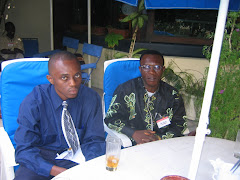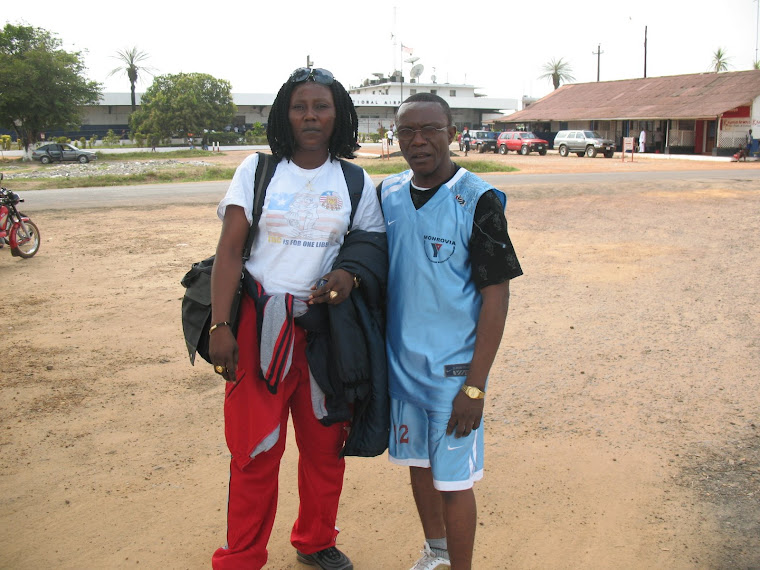(A short story)
By Omari Jackson
Willie Kolmar’s detention did not make sense to him. The police had come to him late Saturday, a month ago, and wanted to speak with him.
“It’s important to see you,” the officer, who had introduced himself, had said, “We’re not here to hurt you.” Willie listened to the officer from the confines of his room, a two-room apartment that he shared with his wife, in central Monrovia. He heard murmurings of several people outside the door, and he felt that something was wrong.
“You’re an officer, right?” His voice was shrill and direct. Since the end of the civil-war the Liberian local police was assisted by the United Nations, and Willie knew they would respect the standard procedure, respecting policing. “Is there any UN police officer with you?”
“Hey, Willie,” the voice outside continued, “We’re all Liberians, and you’re asking if a foreigner is with us?”
It made sense to Willie, but in today’s Liberia, one should not trust too much. But Willie Kolmar could not understand the reason for the visit. As a journalist, and here he examined his activities in recent time, he had not written any story that could be described as “embarrassing” to the government. Except those who were bent on engaging in corruption, and he was determined to expose them, and make life too difficult for them.
So, how come police men were looking for him?
“I know we’re all Liberians,” he said, “and you know that was true of the rebels.”
“We know it is late,” a voice from the other end said, in reassurance, “just nine o’clock and as officers we must do our job.” Willie knew he was making sense. He was a law abiding citizen, and would not want to set an example to disobey and disrespect members of the police service.
“You must have an authority to come here, you know,” he reminded the officer, as his door creaked open, and immediately five officers pounced on him. It was like a dream, lightning fast!
“What the hell is this?”
“We got report,” the officer told him calmly, “you raped a ten year-old girl.”
“You received a report from where?”
“We’re doing our job,” the officer insisted, firmly.
That was how he found himself in this detention center. He could not remember if he insisted on seeing any Warrant of Arrest that the law required for the probable cause, authorizing the arrest and detention of any citizen of the Republic of Liberia.
He knew it was a failure on his part, but then even if he had remembered and insisted on that they would still arrest him, as they did. That night was a humiliation for him.
By the time his wife, Antoinette, who had awaken due to the exchanges, came to the door, the famous journalist’s hands were firmly secured on his back, his eyes downcast, as he fought back tears.
“What happened here, Willie?” Her voice, shocked, could only demand to know her husband’s crime.
“This man,” one of the police officers, said, pointing his right hand to the captive, “raped a ten year-old girl.”
“So you condemn me before we go for the law, eh?” Willie said, because since it was an allegation, the officer should not be too sure about the crime.
“Who told your he raped a ten-year-old?”
“If you want to know,” the same officer informed her, “Come to the station tomorrow.”
So for thirty days, Willie languished in jail, and he knew it was a set up. But who was behind it? The new Liberia, not the one he had known and experienced in the course of the 14 years of war, supposed to change.
“This could be the work of corrupt people in this country,” Willie said it aloud; as he examined what could be responsible for his predicament.
Meanwhile, the local dailies, and even the internet magazine he had been working for had a field day with his story.
“Famous Liberian Journalist Busted for Rape,” one newspaper said. “Journalist Caught In Sex Act,” another said, and gave in graphic details, quoting the mother of the alleged victim, without any quotation from any medical official to confirm the rape.
And so when his wife came to visit in the second day of his detention, and to his horror, he was told about the accuser, Willie just sank into the corner of his cell, and looked into the heaven, as if he was done.
“You brought that girl from the street,” Antoinette told her husband, “now her mother is saying you raped her.”
“I didn't do anything like that?” the journalist said, his face looked spent, tired. “Someone is framing me.”
“The girl ma told the police.” Antoinette said, “The newspaper even say you did it to some Ghana woman you were going out with.”
“So my own people will not get my side of the story,” the journalist said, tears in his eyes. “Somebody has set me up, and my friends are unwilling to come to my help. This is a new day in Liberia indeed.”
The journalist considered the recent allegations and detentions of the misunderstood ex-military general, Charles Julu, and his colleague, Andrew Dorbor, and he understood his agony. However, like the two who were vindicated after their ordeal, he would be vindicated, and then he would fight for, not only those who could not fight for themselves, but for those who would become targets for the powerful establishment.
In truth Willie Kolmar could not admit that he did anything wrong. As his wife reminded him, he remembered almost six months ago when he saw a little girl alone sleeping under a bench, he had felt sorry for her.
There had been several NGOs helping abandoned children in Monrovia and other places, and here he was, able to help out, and the girl of that age, homeless, what would he do? He was a man, a father, who had a fear of God.
That night, he took the girl to a nearby shop, and made sure she ate something, and from there took her to his house.
“Look after her,” he told his wife, “she is your daughter till we can find her ma.” Remembering this story wrenched his heart. He wanted to help one of Liberia’s abandoned children, the ones the government could not help and now see what that action had led him.
And he was even more horrified when on the tenth day of his incarceration, his wife was also detained, for, as he was told, defending him, insisting that he was innocent.
Now that he had been inside for 30 days, he appreciated the experience of those who had been on the other side of the law. Looking around him, the six- by-six room did not give him a way to be comfortable. In the corner on his right sat a small bucket to be used for nature’s demands.
In fact he had to deal with the CIC, a brutish fellow, who had been in detention for his alleged criminal activities. The first night, he was stripped naked, since he did not have the money requested by the CIC.
The room itself was meant to accommodate three to four people; it held nearly ten persons, who had allegedly committed various crimes, and waiting their days in court. And Willie wondered if this was not the new Liberia, created after the violent civil-war. Why? The detained was waiting for their days in court, for more than thirty days. And what did the law say about the number of days for a person to be detained? Willie could only hope for the best.
He decided to fight back, and tell his side of the story.
His lengthy personal narrative on what he considered to be the source of his anguish went out to the general public. It was meant to explain it all and he took pains to pen it. Willie went all out, and pulled all the punches, naming names, and putting the blame where it belonged.
His story, in his own handwriting, appeared in the media, and many people understood why, while others expressed pity for him. “What kind of justice is this?” they asked. Many Liberians made reference to the recent false accusations against two former military officers, and the many months they spent in jail.
“Justice in the jungle, indeed!” many said, in disgust.
Willie, on the other hand knew he was suffering because of his avowed determination to expose corruption and their supporters, and by doing his job, he had stepped on the toes of somebody in high places, and without knowing it he was his target.
Since there was no evidence to link him to the crime that he was said to have committed, he saw the picture clearly, and also realized that he would have a battle to fight.
Though his wife was released the following day, he knew he must fight on, and fight well, and it was necessary, those who caused his incarceration he would help bring them down.
The law, he was aware, said no citizen should be detained more than 48 hours, Willie had been in detention for 30 days now, and so when he was finally processed and appeared before the presiding judge, his accusers, including the prosecution could not provide proof beyond any shadow of doubt of his guilt.
Standing in the dock, the judge almost cried with shame when the prosecution attorney said, “Your Honor, we don’t have sufficient proof against this man.”
As Willie fought back tears, he heard in his mind, the popular Liberian song, “Sweet Liberia,” and lowered his gaze. With all his popularity, if he could be detained for 30 days, what about those unknown thousands? What about those still in detention, who told him that they were innocent of the crimes against them?
As the judge’s gavel lifted in the air to conclude the present saga, Willie heard him say, “Release him and let him go home.” But for Willie, his war had just begun. And it was a war that he would fight to the end. Being vindicated reassured of the goodness in men, and though his experience had all the trappings of revenge, he could not refuse to accept the truth that his experience would serve as a way for him, and others, to understand what was happening in Liberia today.
His vindication had come at a proper time, to make him understand that the experience of the war would result in a situation like a woman in the pangs of distress. And how far she would endure depends on her ability to work for her own salvation.
Posted by Omari Jackson Cell: 404-293-5476: Email: jackson_omari@hotmail.com at 9:34 PM
Monday, June 23, 2008
Subscribe to:
Post Comments (Atom)




No comments:
Post a Comment